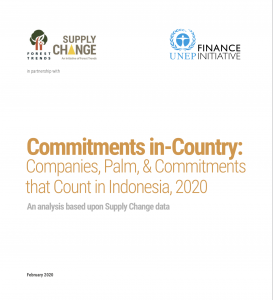Commitments in-Country: Companies, Palm, & Commitments that Count in Indonesia, 2020
By Philip Rothrock and Laura Weatherer View PublicationPalm oil production is a significant driver of deforestation in Indonesia and is propelled by growing domestic and international demand for palm oil-containing consumer goods, chemicals, and biofuel. For companies that produce in or source palm oil from Indonesia, exposure to deforestation presents a serious risk to a company’s business and can have adverse impacts on a company’s long-term financial performance. This may make the company less attractive to financial institutions, which, consequently, may cause portfolio companies in the palm oil sector to incorporate sustainable sourcing and production provisions into their business practices.
Supply Change teamed up with United Nations Environment Programme’s Finance Initiative (UNEP-FI) to 1) learn more about company responses to forest-risks within Indonesian palm oil supply chains and 2) pilot additional metrics to measure how companies assess and respond to these risks. Supply Change researched and analyzed data from over one hundred companies believed to source or produce palm oil in Indonesia.
Key findings:
- Companies that produce and/or source palm oil from Indonesia can face serious business risks if deforestation is hiding in their palm oil supply chains, which can jeopardize their ability to secure investment and financing.
- Supply Change compared the scope of corporate commitments to address palm-driven deforestation for around 100 companies (with the extent of environmental standards established under Indonesian law, the Roundtable for Sustainable Palm Oil (RSPO) certification, and Accountability Framework). The comparison revealed that many companies went beyond Indonesian law via a strong reliance on RSPO certification to address commitment compliance, risk mitigation, and supply chain mapping.
- Supply Change research shows considerable gaps in company disclosure on impact and implementation metrics (e.g., deforestation monitoring, non-compliance, avoidance patterns), which can limit the ability of companies and their investors to accurately assess environmental, social, and governance risks.
Webinar
April 14, 2020, 9:00-10:00am ET
Powerful data and insights can help unlock the capital needed for corporate deforestation-free commitments to lead to results on the ground. During this webinar, UNEP-FI, Forest Trends’ Supply Change Initiative, and leading voices from sustainable finance illustrated this using an example from Supply Change research on palm oil supply chains in Indonesia. Supply Change’s metrics can be used by companies, financial institutions, and government agencies looking to deploy capital toward sustainable supply chains. Palm oil supply chains in Indonesia serve as an example of ways for financial institutions to identify relevant data they need to deploy capital toward companies pursuing sustainable sourcing and production.
Additional Resources
- United Nations Environment Programme Finance Initiative
- How to build deforestation-free supply chains: lessons from Indonesia by Michael Jenkins and Eric Usher

